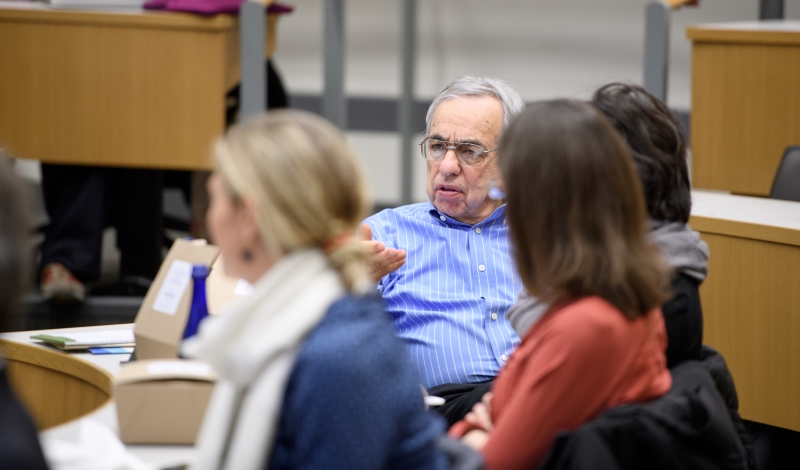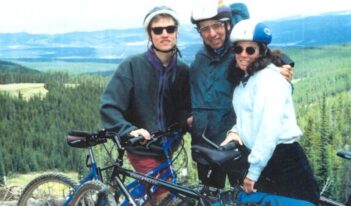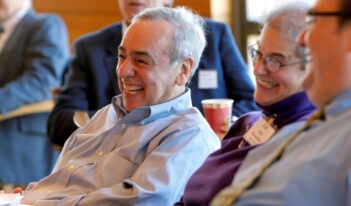
Howard Kunreuther possessed an unparalleled optimism that he passed along to others.
Howard Kunreuther will be remembered for his many brilliant contributions to our understanding of how people think about risk and for his important practical contributions to policies related to disasters. I hope he will also be remembered for his personal warmth and generosity as a mentor. I will always be incredibly grateful that I had the privilege to work in Howard’s department at Wharton and to benefit from his mentorship.
I joined the Wharton faculty in 2009 as an assistant professor in Howard’s group—the Operations and Information Management Department. He warmly welcomed me into the decision processes fold, and he immediately became one of my favorite colleagues. Whenever I was unsure of how to tackle a new research project or handle a political challenge in the department, he was happy meet over lunch (he always insisted on treating) and to help me think through next steps. I could depend upon him to arrive brimming with enthusiasm about whatever new project he was pursuing, and he somehow always seemed equally excited to hear about my work, which was incredibly flattering and encouraging to me as a young, anxious academic.
Even though Howard was roughly four decades my senior, he was an exceptionally active faculty member. I mean “active” in multiple ways—including the fact that he still rode his bike to the office every day, an “active” feat that I have never once managed myself. More remarkably, he was still spearheading incredibly important efforts to apply behavioral science to challenges related to Climate Change and the new risks it presented, traveling the world to present his research and ideas, and leading the Wharton Risk Center, which he co-directed with Paul Kleindorfer and then Bob Meyer.
It was always a treat to walk into the fifth-floor entryway of our department in Jon M. Huntsman Hall and to see Howard holding court at a Risk Center gathering in the conference room. On many occasions, he was there with superstars who I had long hoped to meet but with whom I had never had the chance to interact, and he would come out when I waved “hello” to make sure I was introduced to my heroes. I still vividly recall how excited I was to meet Paul Slovic in just this way. Like Howard, Paul is a giant in the field of judgment and decision making, and I was enormously grateful that Howard went out of his way to give me an opportunity to meet Paul when I was an assistant professor.
Howard was a champion for everyone who worked with him and one of the most optimistic, engaged people I’ve met in academia. When he retired several years ago and I learned that I would be inheriting his chaired professorship, I considered it one of the greatest honors of my career—and I always will.
Howard’s commitment to mentorship was second to none. Even in his seventies, Howard continued mentoring and co-authoring papers with terrific postdoctoral scholars, such as Dena Gromet (who is now a close collaborator of mine and the Executive Director of the Behavior Change for Good Initiative, which I co-direct) and Shirin Chaudry (who is now a professor at the University of Chicago’s Booth School of Business). These are just two very recent examples of generations of scholars who Howard mentored, but they highlight that his impact as a mentor lasted until the very end of his career.
Howard’s Risk Center also became a key funder of doctoral student research on decision making at the Wharton School. Thanks to Howard’s commitment to spreading funds to talented trainees in our community, the Risk Center was able to provide meaningful grants to doctoral students every year, which made a difference in many of their lives and research trajectories. The poster sessions that the Risk Center held for its supported doctoral research were a terrific yearly event spurred on by Howard.
Howard cared deeply about our unique, interdisciplinary department at Wharton, and about ensuring it remained a vibrant, collegial community where serious and generous scholars could thrive. I remember that he was the first person to tell me about our department’s origin story—it was formed roughly 60 years ago with input from the late Nobel laureate Herb Simon, who saw the importance of the side-by-side study of “man and machine.” The group was founded to deliberately blend ideas about both human behavior and optimization. Howard was completely committed to pursuing this vision.
Howard was a champion for improving department dynamics. I remember sitting down with him after a particularly difficult year when I personally felt there were real divisions in our group, and I remain grateful to him to this day for the thought he put into how we could improve things. When I was preparing to become a parent (and I believe I was one of the first women ever to do so in our department), he reached out not only with congratulations but also to suggest concrete resources to help ensure a smooth transition, which I relied on heavily.
I have so many happy memories of my interactions with Howard. These include, among others:
- Howard knocking on my door to say hello;
- Howards stopping by to drop off a copy of his latest book, The Ostrich Paradox;
- Bumping into Howard in the entryway of the department in his biking gear and hearing about his glorious ride into work that morning;
- Whitewater rafting in Howard’s boat after a conference in Pittsburgh (despite being the oldest rider in our boat by nearly a half century, he was much more confident on the water than the rest of us);
- Bumping into Howard at the Society for Judgment and Decision Making annual meeting and being welcomed warmly into whatever conversation he happened to be having with other leaders in our field; and
- Celebrating Howard at his incredible retirement banquet at the Cira Center where his many extraordinary contributions were highlighted by a series of terrific presenters.
I also remember getting an email from Howard in mid-2021—after he had retired–when he learned that my collaborators and I were working on strategies to increase COVID vaccine take-up. Even as an emeritus professor, Howard had important ideas to suggest. He was particularly bullish about vaccine lotteries, and with his enthusiastic support and that of Danny Kahneman, we managed to convince the city of Philadelphia to run a test of a behaviorally designed vaccine lottery.
Over the decades, each time we would get together for lunch at Howard’s favorite restaurant—Pod, the de facto Wharton faculty club—Howard expressed that whatever moment we found ourselves in was “the most exciting time in his career.” His enthusiasm for research and for using it to improve the world was unparalleled. I aspire to sustain a similar degree of passion for my own work and for using behavioral science to improve the world.
The essay is part of a series celebrating the life and scholarship of Howard Kunreuther, titled “Commemorating Howard Kunreuther.”




